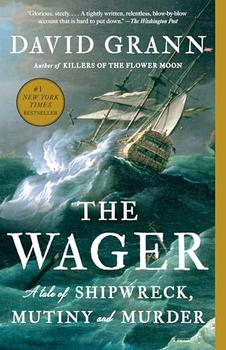Summary | Excerpt | Reading Guide | Reviews | Beyond the Book | Readalikes | Genres & Themes | Author Bio

A Tale of Shipwreck, Mutiny and Murder
by David Grann
Like Anson, Cheap had spent much of his life at sea, a bruising existence he'd at first hoped to escape. As Samuel Johnson once observed, "No man will be a sailor who has contrivance enough to get himself into a jail; for being in a ship is being in a jail, with the chance of being drowned." Cheap's father had possessed a large estate in Fife, Scotland, and one of those titles—the second Laird of Rossie—that evoked nobility even if it did not quite confer it. His motto, emblazoned on the family's crest, was Ditat virtus: "Virtue enriches." He had seven children with his first wife, and, after she died, he had six more with his second, among them David.
In 1705, the year that David celebrated his eighth birthday, his father stepped out to fetch some goat's milk and dropped dead. As was custom, it was the oldest male heir—David's half brother James—who inherited the bulk of the estate. And so David was buffeted by forces beyond his control, in a world divided between first sons and younger sons, between haves and have-nots. Compounding his upheaval, James, now ensconced as the third Laird of Rossie, frequently neglected to pay the allowance that had been bequeathed to his half brothers and half sister: some blood was apparently thicker than others'. Driven to find work, David apprenticed to a merchant, but his debts mounted. So in 1714, the year he turned seventeen, he ran off to sea, a decision that was evidently welcomed by his family—as his guardian wrote to his older brother, "The sooner he goes off it will be better for you and me."
After these setbacks, Cheap seemed only more consumed by his festering dreams, more determined to bend what he called an "unhappy fate." On his own, on an ocean distant from the world he knew, he might prove himself in elemental struggles—braving typhoons, outdueling enemy ships, rescuing his companions from calamities.
But though Cheap had chased a few pirates—including the one-handed Irishman Henry Johnson, who fired his gun by resting the barrel on his stump—these earlier voyages had proved largely uneventful. He'd been sent to patrol the West Indies, generally considered the worst assignment in the Navy because of the specter of disease. The Saffron Scourge. The Bloody Flux. The Breakbone Fever. The Blue Death.
But Cheap had endured. Wasn't there something to be said for that? Moreover, he'd earned the trust of Anson and worked his way up to first lieutenant. No doubt it helped that they shared a disdain for reckless banter, or what Cheap deemed a "vaporing manner." A Scottish minister who later became close to Cheap noted that Anson had employed him because he was "a man of sense and knowledge." Cheap, the once-forlorn debtor, was but one rung from his coveted captaincy. And with the war with Spain having broken out, he was about to head into full-fledged battle for the first time.
The conflict was the result of the endless jockeying among the European powers to expand their empires. They each vied to conquer or control ever larger swaths of the earth, so that they could exploit and monopolize other nations' valuable natural resources and trade markets. In the process, they subjugated and destroyed innumerable indigenous peoples, justifying their ruthless self-interest—including the reliance on the ever-expanding Atlantic slave trade—by claiming that they were somehow spreading "civilization" to the benighted realms of the earth. Spain had long been the dominant empire in Latin America, but Great Britain, which already possessed colonies along the American eastern seaboard, was now on the ascendance—and determined to break its rival's hold.
Then, in 1738, Robert Jenkins, a British merchant captain, was summoned to appear in Parliament, where he reportedly claimed that a Spanish officer had stormed his brig in the Caribbean and, accusing him of smuggling sugar from Spain's colonies, cut off his left ear. Jenkins reputedly displayed his severed appendage, pickled in a jar, and pledged "my cause to my country." The incident further ignited the passions of Parliament and pamphleteers, leading people to cry for blood—an ear for an ear—and a good deal of booty as well. The conflict became known as the War of Jenkins' Ear.
Excerpted from The Wager by David Grann. Copyright © 2023 by David Grann. All rights reserved. No part of this excerpt may be reproduced or reprinted without permission in writing from the publisher.
Your guide toexceptional books
BookBrowse seeks out and recommends the best in contemporary fiction and nonfiction—books that not only engage and entertain but also deepen our understanding of ourselves and the world around us.